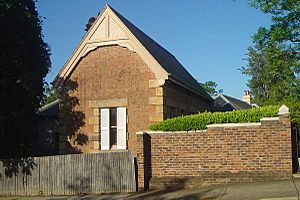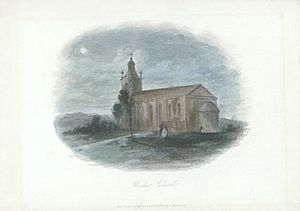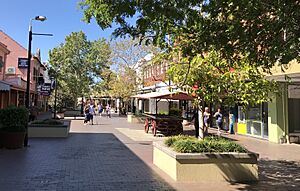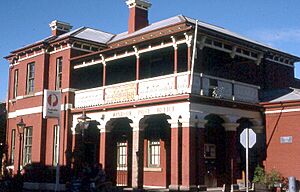Windsor, New South Wales facts for kids
Quick facts for kids WindsorSydney, New South Wales |
|||||||||||||||
|---|---|---|---|---|---|---|---|---|---|---|---|---|---|---|---|
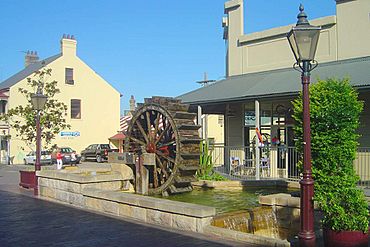
The Windsor Mall (The Water Wheel)
|
|||||||||||||||
| Population | 1,915 (Greater Windsor is 17,000) (2021 census) | ||||||||||||||
| Established | 1791 | ||||||||||||||
| Postcode(s) | 2756 | ||||||||||||||
| Elevation | 21 m (69 ft) | ||||||||||||||
| Location |
|
||||||||||||||
| LGA(s) | City of Hawkesbury | ||||||||||||||
| State electorate(s) | Hawkesbury | ||||||||||||||
| Federal Division(s) | Macquarie | ||||||||||||||
|
|||||||||||||||
Windsor is an old and important town in New South Wales, Australia. It's located north-west of Sydney, right next to the Hawkesbury River. Windsor is the main town for the Hawkesbury area. You'll find many of Australia's oldest European buildings here. It's about 56 kilometers (35 miles) from the center of Sydney, close to where the city's built-up areas end.
Contents
People Living in Windsor
In 2021, about 1,915 people lived in Windsor. The average age was 41 years old. Most people had family roots from England or were Australian. Some also had Irish, Scottish, or Australian Aboriginal backgrounds.
Most Windsor residents were born in Australia. A smaller number came from England or India. Many people in Windsor follow Christianity. The next largest group said they had no religion.
The most common jobs in Windsor include professionals, skilled trades workers, and office workers.
Where is Windsor?
The larger area around Windsor includes nearby suburbs like South Windsor and McGraths Hill.
Windsor is very close to the Hawkesbury River. Because of this, the town has had many big floods. A special horseshoe on the Macquarie Arms pub shows how high the water got in the 1867 flood. After that flood, the beaches along the Hawkesbury River were covered in things washed away from Windsor.
Windsor's Past
The land around Windsor was first home to the Dharuk people. They are one of Australia's indigenous Aboriginal groups.
Windsor is the fourth oldest place in Australia where British settlers built a town. Settlers first arrived around 1791. They chose this spot because it was near the end of the Hawkesbury River where boats could travel. The Dharuk people called the river Deerubbin.
European settlers used the flat, rich land near the river for farming. The area was first called Green Hills. Later, it was renamed Windsor, after a town in England. The town officially became Windsor on December 15, 1810. Governor Lachlan Macquarie named it after Windsor-on-the-Thames in England.
While in Windsor, Governor Macquarie ordered important buildings to be built. These included a church, a school, a jail, and a large inn (Macquarie Arms Hotel). One of the most famous buildings was Francis Greenway's St Matthew's Anglican Church. Governor Macquarie himself picked the church's location. The church was officially opened on December 8, 1822.
Windsor was important because of its good farming land and easy access. In 1813, Governor Macquarie heard about a plan by France to invade the Hawkesbury River area. The plan was to target Windsor's granary (where grain is stored) to stop food supplies to Sydney. This shows how important Windsor was, even on a global scale.
Windsor was known as the "bread basket" because it grew so much food. This food helped the early Sydney colony survive when it was struggling. All the farming caused a lot of dirt to build up in the Hawkesbury River. By the 1890s, the river was so blocked that ships could not reach Windsor from the coast. To help with this, a railway was built in 1864 and a road in 1814.
On January 1, 1803, Daniel Egan was born in Windsor. He later became the Mayor of Sydney in 1853.
Things to See and Do
Windsor has many interesting places to visit. These include The Windsor Mall (which has a Water Wheel) and the Windsor Mall Sunday Market. You can also visit the Hawkesbury Regional Museum, Howe Park, and Windsor Beach. Other attractions are Macquarie Park, Governor Philip Park, and the Hawkesbury Regional Gallery. Don't miss St Matthew's Anglican Church, Windsor Bridge, and the Hawkesbury Paddlewheeler.
Many places in Windsor are listed as heritage sites, meaning they are important historical locations. These include:
|
Media and Entertainment
The local community radio station, Hawkesbury Radio, has its studios in Windsor.
The town of Pitt Town, which is close to Windsor, was used for filming the TV show A Country Practice. It was the setting for the made-up town of Wandin Valley. The old Court House Hotel, Windsor was shown as the doctor's clinic in the show's opening. Windsor High School was also used as the fictional Burrigan High School.
Getting Around Windsor
Sydney's city area has grown so much that it almost reaches Windsor. Windsor is now seen as an outer suburb, but it still feels like a small country town. As the Hawkesbury area grows, there's a greater need for public transport and better roads. In 2016, most people in Windsor drove to work. Only a small number used public transport.
Windsor railway station opened on December 1, 1864. It is on the line that goes to Richmond.
The Windsor Bridge is in the town center. It was built in 1874 and is the oldest bridge crossing the Hawkesbury River. In 2013, there was a plan to replace the old bridge with a new, safer one. Some groups, like Community Action for Windsor Bridge (CAWB), thought a bypass road would be better. They wanted to protect history, keep people safe, and help with traffic. However, a new bridge was built anyway. It opened to traffic on May 18, 2020.
The new bridge is much higher than the old one, which helps during floods. Even so, the new bridge was closed in March 2021 because of very high floodwaters.
Windsor is also connected to Parramatta by the 31-kilometer (19-mile) Windsor Road cycleway. Much of this path follows the North-West T-way.
Shopping and Markets
The Windsor Mall Sunday Market happens every Sunday from 9:00 AM to 3:00 PM. At the market, you can find stalls selling jewelry, books, arts and crafts, paintings, and clothes. There's also fresh local produce, homemade jams, and many food and drink stands.
Images for kids
 | James B. Knighten |
 | Azellia White |
 | Willa Brown |


